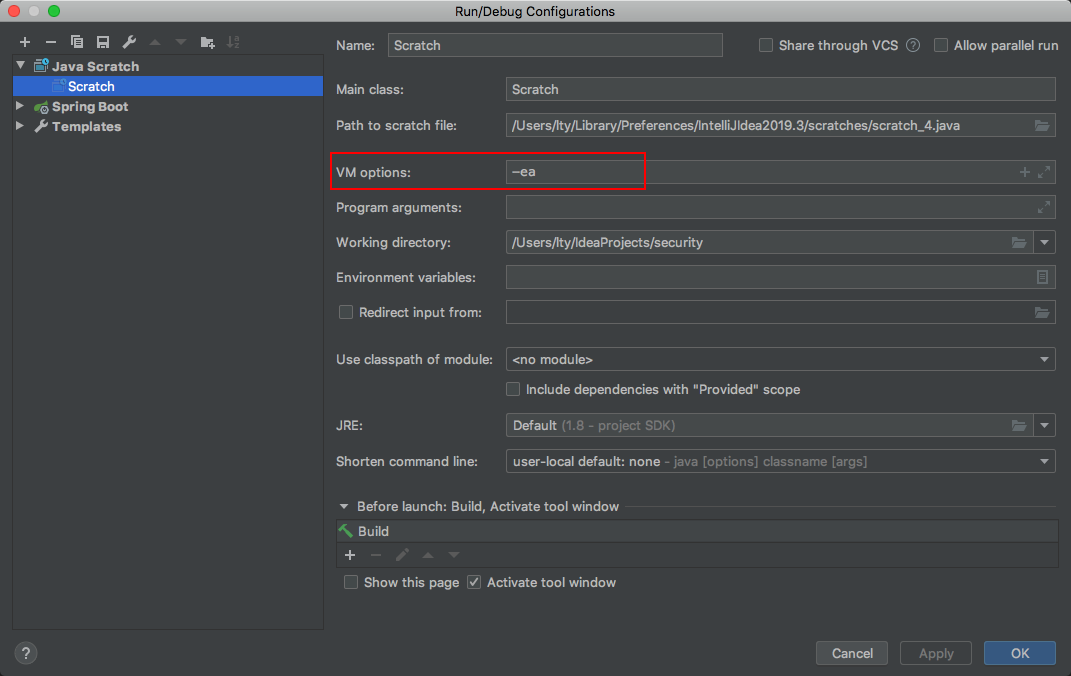如何在 Java 中使用断言
如何在 Java 中使用断言
什么是 Java 断言?
在 JDK 1.4之前,开发人员经常使用注释来记录关于程序正确性的假设。然而,注释作为测试和调试假设的机制是无用的。编译器忽略注释,因此无法使用它们进行 bug 检测。开发人员在更改代码时也经常不更新注释。
在 JDK 1.4中,断言被引入作为测试和调试代码假设的新机制。实质上,断言是在运行时执行的可编译实体,假设你已经为程序测试启用了它们。可以通过编写断言来通知 bug 发生的地方,这样可以大大减少调试失败程序的时间。
如何用 Java 编写断言
编写断言的表达式:
assert BooleanExpr;
如果 BooleanExpr 的计算结果为 true,则不会发生任何事情,并继续执行。但是,如果表达式计算结果为 false,那么将抛出 AssertionError
举个例子
public static void main(String[] args) {
int a = 10;
assert a>100;//false
}
此断言表明开发人员认为变量 a 包含一个大于100的值。但是,情况显然不是这样;
assert 语句的执行导致抛出 AssertionError
运行后没有反应??
有的小伙伴发现自己的IDE并没有抛出Error 这是因为没有显示开启,启用断言开启方法: vm options 加入 -ea

此时我们运行项目 发现抛出了异常
Exception in thread "main" java.lang.AssertionError
at Scratch.main(scratch_4.java:4)
希望获得更多信息?
此时我们已经知道了断言的基本用法 但是抛出Error后我们并不知道是什么问题导致的 还需要去翻看代码找到报错的地方, 如果我们希望获得更多有用的信息 我们可以这样修改Assert语句:
assert BooleanExpr : expr;
expr 是任何可以返回值的表达式(包括方法调用)但是不能调用具有 void 返回类型的方法。一个有用的表达式是一个字符串,用它来描述失败的原因
举个例子
public static void main(String[] args) {
int a = 10;
assert a>100 : "a < 100";
}
运行:
Exception in thread "main" java.lang.AssertionError: a < 100
at Scratch.main(scratch_4.java:5)
无论哪个例子,在不使用-ea (启用断言)选项的情况下运行都不会产生输出。当断言未启用时,它们不会执行,尽管它们仍然存在于类文件中。
前置条件和后置条件
前置条件: 是在执行某些代码之前必须求值为 true 的条件
后置条件: 是在执行某些代码后必须求值为 true 的条件
前置条件
前置条件检查:
import java.io.FileInputStream;
import java.io.IOException;
import java.io.InputStream;
class PNG
{
/**
* Create a PNG instance, read specified PNG file, and decode
* it into suitable structures.
*
* @param filespec path and name of PNG file to read
*
* @throws NullPointerException when filespec is
* null
*/
PNG(String filespec) throws IOException
{
//在非私有构造方法中 使用前置条件
if (filespec == null)
throw new NullPointerException("filespec is null");
try (FileInputStream fis = new FileInputStream(filespec))
{
readHeader(fis);
}
}
private void readHeader(InputStream is) throws IOException
{
//在私有方法中使用前置条件检查
assert is != null : "null passed to is";
}
}
class Scratch
{
public static void main(String[] args) throws IOException
{
PNG png = new PNG((args.length == 0) ? null : args[0]);
}
}
后置条件
后置条件检查:
public class AssertDemo
{
public static void main(String[] args)
{
int[] array = { 20, 91, -6, 16, 0, 7, 51, 42, 3, 1 };
sort(array);
for (int element: array)
System.out.printf("%d ", element);
System.out.println();
}
private static boolean isSorted(int[] x)
{
for (int i = 0; i < x.length - 1; i++)
if (x[i] > x[i + 1])
return false;
return true;
}
private static void sort(int[] x)
{
int j, a;
// For all integer values except the leftmost value ...
for (int i = 1; i < x.length; i++)
{
// Get integer value a.
a = x[i];
// Get index of a. This is the initial insert position, which is
// used if a is larger than all values in the sorted section.
j = i;
// While values exist to the left of a's insert position and the
// value immediately to the left of that insert position is
// numerically greater than a's value ...
while (j > 0 && x[j - 1] > a)
{
// Shift left value -- x[j - 1] -- one position to its right --
// x[j].
x[j] = x[j - 1];
// Update insert position to shifted value's original position
// (one position to the left).
j--;
}
// Insert a at insert position (which is either the initial insert
// position or the final insert position), where a is greater than
// or equal to all values to its left.
x[j] = a;
}
//在 sort ()返回给它的调用者之前,我使用 assert 检查 x 被排序的后置条件。
assert isSorted(x): "array not sorted";
}
}
陷阱
assert关键字用法简单,但是使用assert往往会让你陷入越来越深的陷阱中。应避免使用。笔者经过研究,总结了以下原因:
★1、 assert关键字需要在运行时候显式开启才能生效,否则你的断言就没有任何意义。而现在主流的Java IDE工具默认都没有开启-ea断言检查功能。这就意味着你如果使用IDE工具编码,调试运行时候会有一定的麻烦。并且,对于Java Web应用,程序代码都是部署在容器里面,你没法直接去控制程序的运行,如果一定要开启-ea的开关,则需要更改Web容器的运行配置参数。这对程序的移 植和部署都带来很大的不便。
”
★2、用assert代替if是陷阱之二。assert的判断和if语句差不多,但两者的作用有着本质的区别:assert关键字本意上是为测试 调试程序时使用的,但如果不小心用assert来控制了程序的业务流程,那在测试调试结束后去掉assert关键字就意味着修改了程序的正常的逻辑。
”
★3、assert断言失败将面临程序的退出。这在一个生产环境下的应用是绝不能容忍的。一般都是通过异常处理来解决程序中潜在的错误。但是使用断言就很危险,一旦失败系统就挂了。
”
总结
assert既然是为了调试测试程序用,不在正式生产环境下用,那应该考虑更好的测试JUint来代替其做用,JUint相对assert关键的所提供的功能是有过之而无不及。当然完全可以通过IDE debug来进行调试测试
因此,应当避免在Java中使用assert关键字,除非哪一天Java默认支持开启-ea的开关,这时候可以考虑。对比一下,assert能给你带来多少好处,多少麻烦,这是我们选择是否使用的的原则,读者可以自行取舍.
完 小伙伴记得点赞 关注!!

今天我们主要分析Thread Dump

学习单例模式引发的思考

JVM生成的这3种文件,你都见过吗?

一文搞懂什么是事务
